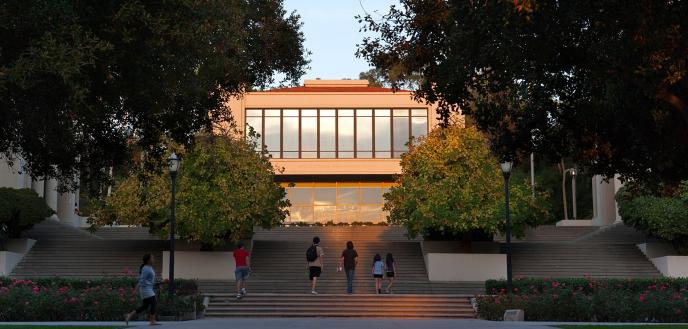Associated Students of Occidental College (ASOC) President Jacques Lesure (senior) organized discussion groups with several board of trustees members April 26 in order to facilitate multi-constituent dialogue on a number of ongoing issues at the school. Lesure informed the campus of the board of trustees meeting via email April 17. There were seven meetings held in various locations across campus — each meeting had a coordinator alongside at least one board member, student, and staff or faculty member.
Nearly 70 community members signed up to attend. In order to ensure privacy, the attendees names have been kept private. The meeting coordinator said that the meeting had no agenda but was a space for open dialogue. Members raised questions on how to improve collaboration between students, faculty, administration and the board. Topics of discussion included theresignation of former Chief Diversity Officer (CDO) Rhonda Brown, the resignation of black studies professor Courtney Baker and the divestment of the schools funds from Israel, among other issues.
Noah Schucking (junior), ASOC chief of staff, said Occidental is currently at a critical point for change within the administration. He said it was crucial for current students to participate and make their voices heard in order to improve the experiences of future students.
“We should recognize that we are at a critical position in determining the future of Occidental College,” Schucking said. “I believe it would be a disservice for us to miss out on this opportunity to improve the student body experience for students a decade from now. I think that it’s critical that we participate as much as we can.”
At one listening circle in Swan Hall, a board member, who is also a parent of an Occidental alum, said Occidental has made her family closer and that she was grateful to be asked to serve on the board. Another board member and former Occidental alum said the board of trustees was in place to make the school better. He said he wanted to erase the idea that the board was a segregated entity with no connection to the Occidental community.
“We need to squash the perception that we’re a shadowy group sitting in a dark room making whimsical choices about the college. It’s not a monolithic group. We have people of color, women… age range is pretty extensive. There is debate in the group, is not one voice,” the board member said. “Next generation, you might be sitting on the board. We just want to get it right for you all because you are the future. You are our priority.”
A staff member said that a lot of students did not understand the nature of the board. She also said that the board could appear unreachable at times. Another staff member said there was a perception that the board of trustees were a distant entity that made all of the decisions on campus. He said that he did not know how to reach the board.
“I’ve worked here 14 years, I’ve never spoken to a trustee. How would I go about communicating with the board?” the staff member said. “It might just be the nature of my job, but it very much does feel like the board is shadowy, monolithic. The board is doing this, doing that, but I don’t feel involved in that process at all.”
One administrator said that this disconnect could be due to lack of information about the structure of the board. The administrator said that improving the pathways of communication between student, faculty and staff could help minimize confusion.
The discussion circles occurred one week after the Diversity and Equity Board (DEB) hosted a meeting with President Jonathan Veitch April 19, aimed at fostering student and administration collaboration, according to an email from DEB that same day. In the email, DEB said the purpose of the April 19 meeting was to discuss the replacement of former Chief Diversity Officer (CDO) Rhonda Brown. Alongside Veitch, Dean of Students Rob Flot was also present.
Natalia Guerra (senior), DEB secretary, said that the group discussion with Veitch was constructive and that the meeting felt like a conversation instead of DEB merely listing their grievances to the administration.
“To have [President Veitch] take the time to talk to us and demonstrate that this is something that he cares about — at least symbolically — was really, really important,” Guerra said. “Although we didn’t agree on all points, I feel like we were able to move past that and move forward in this culture of understanding.”
Moving forward, a student at the board of trustees listening circle said she hoped that the board would incorporate what the multi-constituent group had discussed. She said it was frustrating for students to feel that discussions or listening circles did not always result in change at the school. The board members said they would be traveling to a board retreat in three weeks where they would bring up the topics from the listening circles.
Schucking said he was pleased with the establishment of the listening circles and hoped the administration would listen to what students had to say. He also said he was unsure if the discussions would lead to any developments. He said the idea of shared governance alongside collaboration between administration and students was imperative for the school to move forward.
“I just hope that that the administration puts in as much energy as needed in order to address student concerns,” Schucking said. “I think that it is easy to allow for all this to turn to just simple discussions and no action. I hope that [the] administration moves forward with that.”
![]()




































